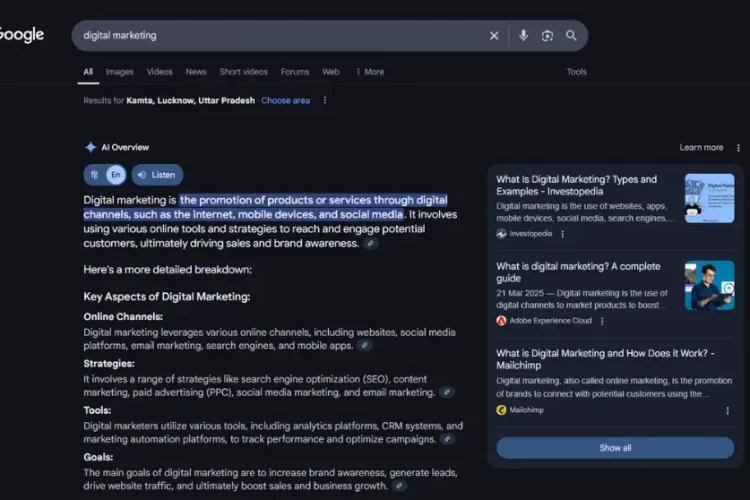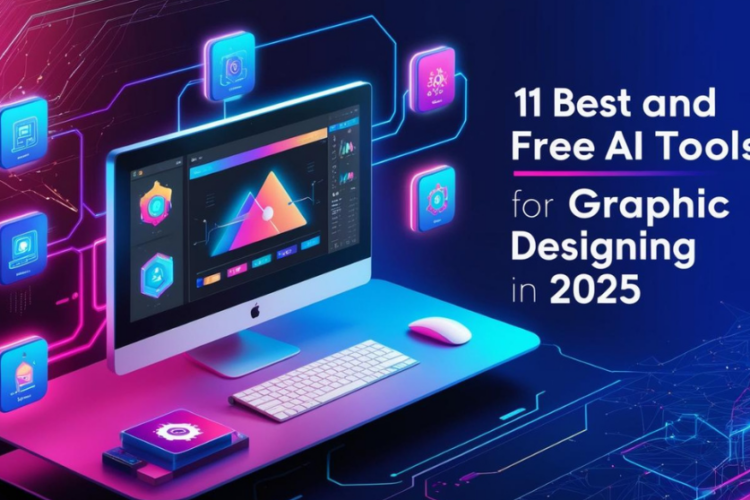
Artificial intelligence (AI) is reshaping industries in 2025 with innovative tools like Jasper AI, DALL-E 2, and ChatGPT. These tools are helping businesses automate operations, create personalized customer experiences, and enhance productivity across sectors like retail, healthcare, and finance. This blog highlights the top generative AI tools, their practical applications, and the latest trends shaping the future of AI, offering insights on how businesses can successfully integrate AI into their strategies.
Artificial Intelligence (AI) is transforming businesses in many unexpected ways. In 2025, many companies are utilizing AI tools to streamline their operations, create innovative products, and deliver exceptional customer experiences. AI technology is not just a futuristic concept; it is a necessity for businesses striving to remain competitive in today’s world.
This blog explores top generative AI tools and the transformative potential of artificial intelligence in business. Let’s look into how these tools are reshaping industries and the AI trends driving their adoption.
What is Generative AI?
Generative AI is a branch of AI that creates new content such as text, images, videos, and music. Unlike traditional AI that analyzes data, generative AI produces original work by learning from existing data. This capability has vast applications across industries, enabling businesses to automate processes, enhance creativity, and deliver personalized customer experiences.
Key Benefits of Generative AI:
- Content Automation: Automates the creation of blogs, social media posts, and marketing materials.
- Product Design: Generates creative ideas for product development.
- Customer Interaction: Powers chatbots and virtual assistants for better customer support.
- Cost Efficiency: Reduces costs associated with manual work and repetitive tasks.
Top Generative AI Tools for Businesses in 2025
Businesses in 2025 rely heavily on advanced AI tools to enhance productivity. Here are some of the most popular generative AI tools:
1. GitHub Copilot
- Purpose: Assists software developers by suggesting code snippets.
- Impact: Makes coding faster and reduces errors.
- Example: Developers use Copilot to write complex functions in seconds.
2. Jasper AI
- Purpose: Creates high-quality text for marketing and content creation.
- Impact: Saves time for marketing teams by automating writing tasks.
- Example: Businesses generate blogs, ad copy, and social media posts with ease.
3. Claude by Anthropic
- Purpose: Processes large texts and engages in natural conversations.
- Impact: Helps businesses summarize documents and analyze customer feedback.
- Example: Used in customer support for detailed responses.
4. Synthesia
- Purpose: Creates professional AI-driven videos.
- Impact: Useful for training materials and marketing.
- Example: Businesses use Synthesia to produce multilingual video tutorials.
5. DALL-E 2 by OpenAI
- Purpose: Generates realistic images from text descriptions.
- Impact: Helps in product design and marketing campaigns.
- Example: Used by designers to create concept visuals.
6. ChatGPT
- Purpose: Powers customer service chatbots and automates tasks.
- Impact: Enhances customer engagement with quick responses.
- Example: E-commerce businesses use ChatGPT for 24/7 customer support.
7. Runway ML
- Purpose: Creates and edits video content.
- Impact: Simplifies video production for marketing and branding.
- Example: Marketing teams use it for dynamic visual content.
8. Midjourney
- Purpose: Produces artistic images from text inputs.
- Impact: Boosts creativity in digital marketing and product visualization.
- Example: Fashion brands use it for creating unique designs.
Also Read: 11 Best and Free AI Tools For Graphic Designing in 2025
How AI Technology is Transforming Businesses
AI technology is creating a significant impact across various industries. Let’s explore how businesses are leveraging AI:
1. Retail
- Personalized Shopping: AI analyzes customer preferences to recommend products.
- Inventory Management: Predicts demand to maintain optimal stock levels.
- Enhanced Customer Experiences: Chatbots handle queries efficiently.
2. Manufacturing
- Predictive Maintenance: AI detects equipment issues before breakdowns.
- Automation: Robots powered by AI streamline production lines.
- Quality Control: AI identifies defects in real-time.
3. Healthcare
- Medical Diagnosis: AI analyzes patient data to detect diseases.
- Drug Discovery: Accelerates research and development.
- Patient Care: Virtual assistants guide patients through treatments.
4. Finance
- Fraud Detection: AI identifies suspicious transactions.
- Investment Strategies: AI algorithms analyze market trends.
- Customer Support: Chatbots assist with account inquiries.
5. Supply Chain Management
- Demand Forecasting: AI predicts future demands for efficient planning.
- Route Optimization: AI finds the fastest and most cost-effective delivery routes.
- Risk Management: AI identifies potential disruptions in the supply chain.
Generative AI Examples in Business
Generative AI is reshaping how businesses operate. Here are real-world examples of its use:
- Content Creation: Jasper AI generates engaging content for digital marketing campaigns.
- Product Design: DALL-E 2 assists designers in visualizing innovative product ideas.
- Customer Support: ChatGPT handles customer queries, improving satisfaction.
- Video Production: Synthesia creates professional-grade videos in multiple languages.
- Marketing: Midjourney helps businesses craft visually appealing advertisements.
Also Read: 7 Social Media Trends to Capitalize on in 2025
AI Trends Shaping 2025
AI trends in 2025 are shaping the future of industries. Businesses must adapt to these trends to stay competitive:
1. Increased Automation
- Automating repetitive tasks to free up human resources for strategic work.
2. Enhanced Personalization
- Delivering tailored experiences to customers based on their preferences.
3. AI-Powered Analytics
- Using AI for deep data analysis to inform business decisions.
4. AI Integration Across Industries
- Expanding AI use in healthcare, finance, retail, and education.
5. Ethical AI Practices
- Ensuring AI systems are transparent, unbiased, and ethically sound.
How to Develop an AI Strategy for Businesses
An effective AI strategy is crucial for leveraging AI’s potential. Here’s how businesses can develop one:
- Set Clear Objectives:
- Identify goals like improving customer service or increasing efficiency.
- Invest in Training:
- Equip employees with skills to work with AI tools.
- Choose the Right Tools:
- Select AI tools that align with business needs.
- Maintain Data Quality:
- Ensure data is accurate and up-to-date for reliable AI outputs.
- Monitor Performance:
- Regularly evaluate AI tools and make necessary adjustments.
Future of Artificial Intelligence in Business
The future of artificial intelligence in business is promising. Here are some expectations:
1. Improved Decision-Making
- AI will provide deeper insights, enabling better business strategies.
2. Enhanced Customer Experiences
- AI will offer more personalized and efficient interactions.
3. Innovation in Products and Services
- AI will drive the creation of new, customer-focused products and services.
4. Sustainability
- AI will help businesses adopt sustainable practices by optimizing resource use.
Uses of Artificial Intelligence in Retail
Retail businesses are leveraging AI to revolutionize operations:
- Targeted Marketing: AI analyzes customer behavior to create personalized ads.
- Smart Shelves: AI sensors monitor stock levels and alert for replenishment.
- Customer Analytics: AI provides insights into buying patterns.
- Fraud Prevention: AI detects suspicious activities in real-time.
- Augmented Reality Shopping: AI integrates with AR to enhance the shopping experience.
Impact of AI on Business
AI’s impact on business is profound:
- Efficiency: Speeds up processes and reduces manual errors.
- Cost Savings: Automates tasks, reducing operational expenses.
- Innovation: Fosters the development of new products and services.
- Scalability: Enables businesses to expand operations without proportional cost increases.
- Global Reach: AI tools like ChatGPT facilitate communication across different languages.
Also Read: How To Turn Negative Online Reviews Into Business Opportunities
Conclusion
AI technology, particularly generative AI, is revolutionizing the business landscape in 2025. Tools like GitHub Copilot, Jasper AI, and DALL-E 2 empower businesses to innovate, automate, and personalize their operations. By adopting an effective AI strategy and staying abreast of AI trends, businesses can harness the full potential of this transformative technology.
As AI continues to evolve, its integration into various industries will become even more significant, driving growth, efficiency, and innovation.
Want to know more about Generative AI? Do let us know in the comment box below this blog and stay tuned with The Aspiring CEO for more such informative and valuable content.
FAQs
What is generative AI, and how does it differ from traditional AI?
Generative AI focuses on creating new content such as text, images, or code, while traditional AI is designed to analyze and predict based on existing data.
Which industries can benefit the most from AI technology?
Industries like healthcare, retail, finance, manufacturing, and entertainment are seeing significant advantages from implementing AI solutions.
What are some examples of generative AI tools in 2025?
Examples include tools like ChatGPT for content generation, DALL-E for image creation, and Codex for programming assistance.
How does AI technology impact small businesses?
AI can streamline operations, improve customer service, enhance marketing strategies, and provide data-driven insights even for smaller enterprises.
What is the role of AI in retail?
AI enhances retail by providing personalized shopping experiences, inventory management, and fraud detection, among other applications.
Are AI tools expensive for businesses to implement?
Costs vary depending on the tool and its complexity, but many solutions offer scalable pricing, making them accessible to businesses of all sizes.
How can businesses start integrating AI into their operations?
Businesses can begin by identifying repetitive tasks, exploring AI tools tailored to their industry, and consulting with AI experts for strategy.
What are the ethical concerns associated with AI?
Ethical concerns include data privacy, bias in AI models, and the potential displacement of jobs due to automation.
How can AI help in creating a competitive edge for businesses?
AI enables faster decision-making, better customer engagement, and innovative product or service offerings, giving businesses a significant advantage.
What are the future trends in artificial intelligence?
Future trends include advancements in generative AI, AI-driven personalization, ethical AI frameworks, and increased use of AI in sustainability efforts.


